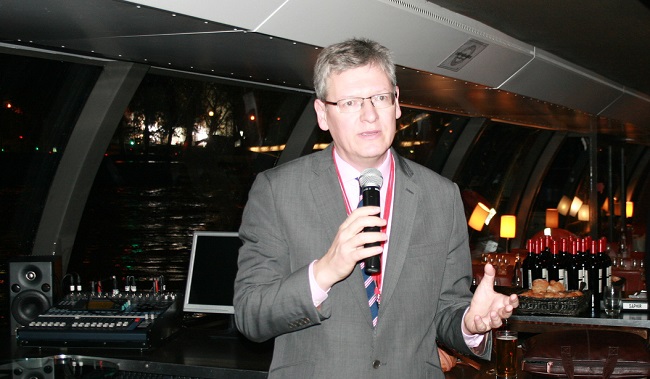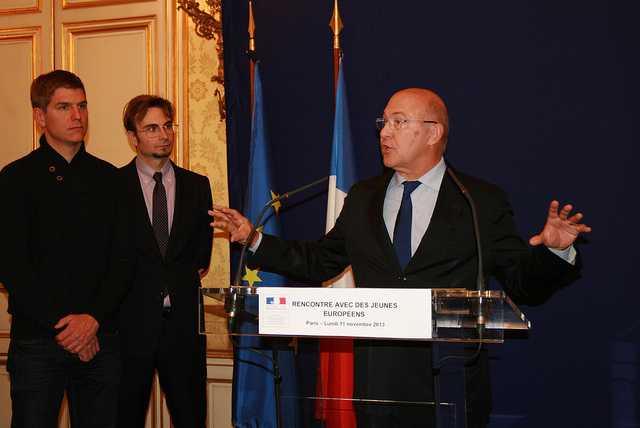From November 11th to the 13th, the Organisation for Economic Co-operation and Development (OECD or OCDE in French) headquarters in Paris hosted the Youth Summit on Youth Employment, which took place parallel to the Paris Intergovernmental Summit of the EU Members States on the same issue.
As member of the Comité Directeur of AEGEE-Europe, I was able to represent our organization at this summit thanks to the invitation issued by the European Youth Forum (YFJ). Unfortunately, no members from our Youth (un)Employment project could come, because at the same time, preparations for the Y-Vote convention on Youth Employment were taking place in Agrigento.
The Youth Summit in Paris was special since, for the first time, it brought the two main non-governmental actors in the field of employment for young people together: trade unions and national youth councils. Why they had not managed to sit down to draft a common strategy, when the destruction of jobs in Europe is a problem for several years already, is still a mystery to me.
The discussions covered different fields, among which a big highlight was an update on implementation of the Youth Guarantee Scheme established by the European Union. The Youth Guarantee aims to provide all young Europeans with a job, a traineeship or an education opportunity within the next four months after ending studies or finishing their contract. Even if far from the estimation of 21 billion Euros that are needed for the scheme, the 6 billion Euros provided by the EU can have a big impact as a first step. Therefore, it was quite disheartening to see that the preparations are quite behind schedule in many member states, specially among those with higher youth unemployment rates. They are supposed to be ready by the end of December.
When implementing the Scheme, we saw how some countries clearly modify the target groups and risk to subvert the actual spirit of the proposal. The youth organisation has always claimed a role in deciding and monitoring the implementation of the Youth Guarantee; but this co-decision power has seldom been granted, and in many countries the implementation plan will be prepared last-minute, in a closed office without input from the affected groups.
Another issue of the summit was the importance of focusing attention on inclusion of the NEETs (people who are Not in Education, Employment or Training) which is a population in great risk of social exclusion. The percentage of NEETs in society vary enormously from country to country, but because most countries do not include them in Unemployment statistics, they are a hidden group in big risk of exclusion.
At the same time at the summit, the presidents of most EU-countries met in Paris receiving huge media coverage, but little results. The fact that this extraordinary meeting had been called, seems a very effective way to present to the public opinion how “much” the governments care about one of the most pressing problems in Europe. But the participants at the summit would have liked to see more tangible results than front-page pictures of shaking hands, press releases, and the scheduling of a next meeting in Rome for Spring. A call for less talk and more action was the common message of almost all interventions and during the street action that was held on Tuesday.

EU Commissioner László Andor updated the participants on the outcome of the Intergovernmental Summit.
At least our Youth Summit is the start of a new period of collaboration among youth stakeholders. And we will keep ourselves working to improve the problem of youth employment. At the same time we will try to ensure that from now until the next Summit in Rome, advancements are made and no more time is lost. The next summit will take place in Spring, in the middle of the campaign for the EU elections. Political leaders will definitely plan to stage themselves carefully to the media, in order to take political advantage. But we will also make sure to use the media coverage to make our voices heard and denounce any failure in using all the available resources to fight the Youth Unemployment crisis.
Once I was back in Brussels, I went to the European Parliament to attend a Round Table Discussion on the quality of internships, which is a very relevant issue in Europe and especially in Brussels, which has a big population of interns. The issue of unpaid internships (which is an opportunity only available to those who have enough money to cover some months without income), and the intern positions that don’t provide enough learning and training (just providing employers with low-waged workers), were among the most mentioned problems of the current situation.
Both events’ information was sent regularly to Agrigento, where it fed into the discussions of the Y-Vote convention, and where they were transformed into recommendations that will be passed to the new European Parliament to be elected in May 2014. Moreover, it gave me some ideas to reboot our Youth (un)Employment project that has been dormant in the last few months. If you are motivated to contribute to solving one of the biggest challenges in Europe nowadays, why not join the project? Please contact the team at yue@aegee.org, or answer to the Open Call that will be launched soon on the ANNOUNCE-L mailing list.
Written by: Miguel Gallardo Albajar, member of the Comité Directeur


